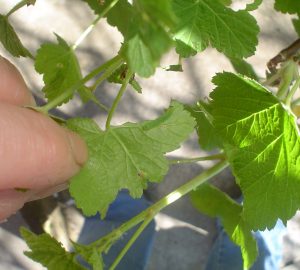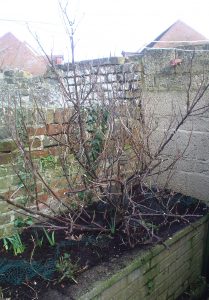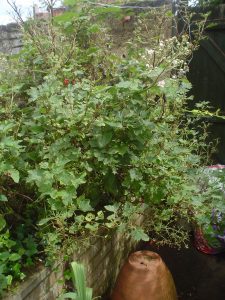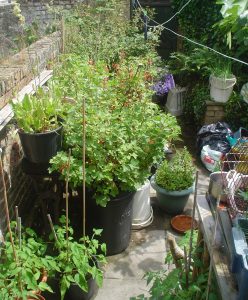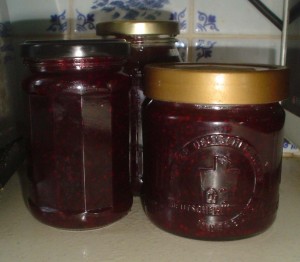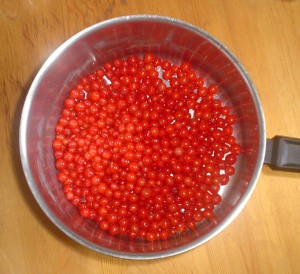What’s eating our redcurrants. Update #4
Well, the manure didn’t work (see this post) – about ten days ago, I realised that once again, my redcurrants were being eaten alive. Last Sunday, I started the offensive against the culprit, namely these little critters (sawfly larvae):
There were hundreds of them. It needed several hour-long sessions to kill the majority, which I achieved by donning a pair of rubber gloves and squishing them between my thumb and forefinger. They could mostly be found at the edges of the leaves, methodically chewing their way to the centre. I will venture out with the Marigolds again tomorrow morning.
On a brighter note, the strawberry containers in the front are doing well.
Categories: crops, other pests Tags: redcurrants, sawfly
What’s eating our redcurrants. Update #3
I ordered my usual three 70 litre bags of compost from Local Hardware Store during the week, and remembered to add a couple of bags of well-rotted horse manure to my order. So there’s now a layer of it sitting on the soil around my redcurrant bushes:
This is a follow on from my last post, where I’d discussed the sawfly problem with a fellow gardener. I also had a go at a bit of light pruning, clipping off any diseased twigs and removing one or two big branches that were rubbing up against other branches and generally getting in the way. But frankly I still don’t feel I know what I’m doing when it comes to pruning redcurrants.
The next stage is to wait till the leaves come out, and pick off any larvae that I find from the undersides. Hopefully most of them won’t have made it that far, thanks to the manure.
Encouraged by today’s lovely weather, I also turned over the compost heap, picked off surplus figs from the fig tree and divided the sorrel (grows in a black bucket, not visible in the above pic).
Categories: compost, crops, other pests, pruning Tags: compost, fig tree, figs, horse manure, manure, redcurrants, sawfly, sorrel
What’s eating our redcurrants? Update #2
I had a great conversation with another vegetable grower the other week, over a game of bowls. I mentioned my sawfly/redcurrant problem (see this post), and she gave me the following tip: horse manure. Stick a layer of horse manure over the soil (in early spring, I think she said), and the sawfly larvae will have a much harder job to emerge and plunder your redcurrant bushes. Something to think about.
Categories: crops, other pests Tags: redcurrants, sawfly
What’s eating our redcurrants? (a tale of two bushes)
We have two redcurrant bushes. (Well, actually we have three – there’s another one in our front garden, doing its best to disguise itself as an ornamental deciduous shrub.) OK then, we have two redcurrant bushes in our back garden. One of them is in an old dustbin and is doing OK (see bottom pic). I picked a couple of punnets’ worth from the dustbin currant on Sunday, and have put them in the freezer.
The other bush, which is in the raised bed by the back wall, isn’t faring so well. It’s being eaten up by a mysterious pest, which has destroyed the leaves and nobbled any fruit before they had a chance to develop. The back bed is also a haven for snails; possibly it’s these which are responsible for eating the fruit. I confess I have neglected this bed – I’ve let the brambles run riot and I haven’t pruned the redcurrants, because the whole subject of pruning fruit bushes scares me. I’m going to have to get over my pruning phobia if I want to get any fruit off this bush next year, and also monitor the bush more closely in the spring for signs of any larvae/insects.
From what I understand (http://www.gardenseeker.com/pruning/pruning-redcurrants.html), you need to prune in late winter/early spring and cut back the older growth to the ground, as well as cutting any wispy side shoots from the previous year’s new growth. So this post is a reminder to get my secateurs out in early March.
PS: the bonus cat is Magnus. We’re down to just him now, since Lottie the tabby died a month ago at the age of 22 🙁
Categories: crops, other pests, pruning Tags: redcurrants
Redcurrant jam, Empress Felicity style
| What do you do when you’re not an expert jam maker? You turn to your mum’s old recipe books of course. In my case, the book is Marguerite Patten’s Cookery in Colour, a worthy tome first published in 1960. There wasn’t a recipe for redcurrant jam, but there was one for blackcurrant jam, so I used that. For the weight of currants I had (2 pounds 10 ounces or 2.625 pounds), I would have needed just under 2 pints of water and just over 3 and a quarter pounds of sugar, according to this recipe. |
| Being chronically incapable of following recipe instructions, I used about 1 pound ten ounces of sugar and just over one pint of water, reasoning that (a) the currants were oozing plenty of juice already, and (b) surely nobody would want THAT much sugar in their jam. Following Mr Beans’ recommendation I also used the juice of half a lemon, to help with setting. |
| The instructions in Ms Patten’s book were: 1. boil up the currants with the water until they go mushy, and (b) add the sugar, stir to dissolve and boil the bejeesus out of the mixture until set. Well, it didn’t say “boil the bejeesus”, but that was the basic gist, anyway. I complied with the instructions, but added the lemon juice and associated pulp about halfway through the boiling process. The result was three jars of a dark garnet red jam, which tastes gorgeous. Because I used so much less sugar (and added some lemon juice), the jam tastes lovely and tart – a real grown-up flavour. |
| If you’re wondering what all my quantities are in metric, here they are:
2 pounds 10 oz (2.625 pounds) currants = 1.2 kg |
Categories: cooking Tags: jam, redcurrant jam, redcurrants
2013: the year that summer was one month late
| Anyway, back to the redcurrants. They are superb. I never expected this much fruit from just a couple of bushes. Since that first saucepan-full, I’ve picked three more lots and there will be at least one more to go. The first batch was stewed with enough sugar to give a sweet-but-tart flavour. Stewed redcurrants make a great accompaniment to roast pork or poultry. The rest are being frozen in batches. |
| Another success story this year has been our rhubarb patch (in the corner of another raised bed), which has finally got going. I’ve managed to get four or five batches of stewed rhubarb from it. In the process, I discovered a tasty way to eat it – with vanilla yoghurt. Rachel’s Organic Vanilla is nice, if expensive. Or you can buy supermarket’s own natural yoghurt, and add sugar/natural vanilla to taste. For a more substantial dish – a proper meal as opposed to a dessert – add raw porridge oats to the yoghurt, stir in and leave for half an hour before adding the fruit. |
| Sadly, it’s not all been good news. The mouse melon seeds I planted at the same time as my tomatoes grew into healthy looking seedlings, which I hardened off outdoors before potting up and placing against our extension wall. A couple of them have died and the others are not growing at all. I don’t know what went wrong there. Not enough sun, I suspect. I still have some seeds left so will try again next year. |
Categories: crops Tags: mouse melon, raspberries, redcurrants, runner beans, strawberries, tomatoes
